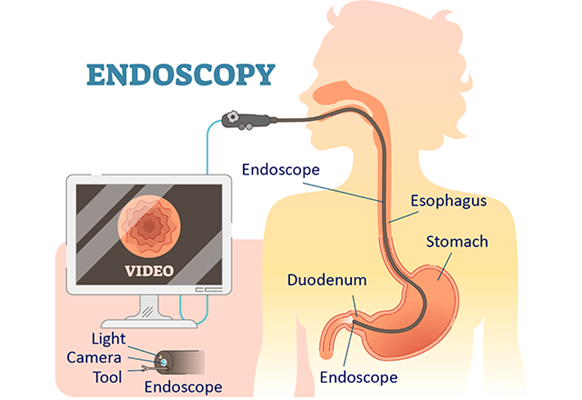Endoscopy
Endoscopy in Shivaji Nagar & yerawada
What is an Endoscopy?
An endoscopy is a procedure in which your doctor uses specialized instruments to view and operate on the internal organs and vessels of your body. It allows surgeons to view problems within your body without making large incisions.
A surgeon inserts an endoscope through a small cut, or an opening in the body such as the mouth. An endoscope is a flexible tube with an attached camera that allows your doctor to see. Your doctor can use forceps (tongs) and scissors on the endoscope to operate or remove tissue for biopsy.

Why Do I Need an Endoscopy?
Your doctor may order an endoscopy to visually examine an organ. An endoscope’s lighted camera allows your doctor to view potential problems without a large incision. A screen in the operating room lets the doctor see exactly what the endoscope sees.
Your doctor may suspect that an organ or specific area of your body is infected, damaged, or cancerous. In this case, your doctor may order an endoscopic biopsy. An endoscopic biopsy involves using forceps in an endoscope to remove a small sample of tissue. They will send the sample to a lab for testing.
Your doctor will review your symptoms, perform a physical examination, and possibly order some blood tests prior to an endoscopy. These tests will help your doctor gain a more accurate understanding of the possible cause of your symptoms. These tests may also help them determine if the problems can be treated without an endoscopy or surgery.
How Do I Prepare for an Endoscopy?
Your doctor will give you complete instructions on how to prepare for your endoscopy. Most types of endoscopy require you to fast for up to 12 hours before the procedure, but your doctor will clarify this. Your doctor may give you laxatives or enemas to use the night before the procedure to clear your system. This is common in procedures involving into the gastrointestinal tract through the anus.
Prior to the endoscopy, your doctor will do a physical examination and go over your complete medical history, including any prior surgeries. Be sure to tell your doctor about any medications you’re taking, including over-the-counter drugs and nutritional supplements, and also alert your doctor about any allergies you might have. You may need to stop taking certain medications if they might affect bleeding.
You may want to plan for someone else to drive you home after the procedure because you might not feel well from the anesthesia.
What Are the Risks of an Endoscopy?
Endoscopy has a much lower risk of bleeding and infection than open surgery. Still, endoscopy is a medical procedure, so it has some risk of bleeding, infection, and other rare complications such as:
- chest pain
- damage to your organs, including possible perforation
- fever
- persistent pain in the area of endoscopy
- redness and swelling at the incision site
The risks for each type depend on the location of the procedure and your own condition. For example, dark-colored stools, vomiting, and difficulty swallowing after a colonoscopy could indicate that something is wrong.